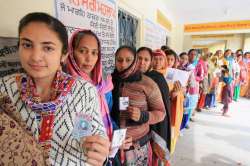Campaign in the first of seven phased Uttar Pradesh Assembly elections for 73 seats ended today with all parties mostly focusing on voter reachout on the ground.
All 73 seats lie in communally sensitive western Uttar Pradesh where Prime Minister Narendra Modi staked his all in the fight against SP-Congress alliance and BSP making it essentially a triangular contest.
The seats are spread across 15 districts in the western part of the state, including Muzaffarnagar and Shamli that were singed by communal riots in 2013.
The other districts are Baghpat, Meerut, Ghaziabad, Gautam Budh Nagar, Hapur, Bulandshahr, Aligarh, Mathura, Hathras, Agra, Etah, Firozabad and Kasganj.
There are 2.57 crore eligible voters in the first phase which includes more than 24 lakh first-time voters in the age group of 18-19 years and 1.17 crore women.
Polling in these seats would be held on February 11.
Stakes are high for all parties as this phase is likely to set the tone for the elections in the remaining six phases which would end on March 8.
Urging the voters to end the 'vikas ka vanvas' (exile of development) and projecting demonetisation as an attack against corruption, Modi and BJP accused SP and BSP of plundering the state over the years and targeted the SP-Congress alliance, saying the two had come together to save themselves.
Joining hands with Congress leader Rahul Gandhi, Chief Minister Akhilesh Yadav led the SP assault, as party patriarch Mulayam kept away following family feud, with the two scions taking on Modi over "suffering" of common man due to note ban and his "unfulfilled" promise of 'acche din'.
Akhilesh also reached out to voters on his "performance", claiming his government had taken up development works like Metro and expressways.
The seats are spread over 15 districts of western Uttar Pradesh, including riot-scarred Muzaffarnagar and Shamli. BJP leaders like Yogi Adityanath and Sangeet Som raised the issue of alleged exodus of Hindus from some areas and accused the SP government of favouring a particular community.
In the last election SP and BSP had bagged 24 seats each and BJP had 11 out of the 73. The saffron party is hoping toimprove its tally as it had bagged 71 out of 80 seats in the state in the 2014 general election, but the SP-Congress tie-up has added a new dimension to the contest.
The region is also a stronghold of Rashtriya Lok Dal of Ajit Singh which had bagged nine seats while the Congress had got only five.
The Muslim-dominated areas in the belt will be an acid test for BSP chief Mayawati, who is banking heavily on Dalit-Muslim vote bank.
The region was once BSP's favourite hunting ground.
In her rallies, Mayawati accused the Modi government of interfering with the personal law of Muslims and ending reservations for backward communities in jobs. She targeted Akhilesh government over the law and order situation and cautioned Muslims time and again that if they wanted to defeat BJP, they should not waste their votes by backing SP-Congress alliance.
As the campaign peaked, BJP stepped up its attack on the SP-Congress alliance terming it as a "theatre of the absurd".
Both Modi and BJP president Amit Shah hopped from one rally to another asking voters to choose between development agenda of BJP and those who give shelter to criminals, indulge in vote bank politics and encourage land and mine mafias.

